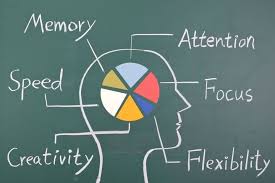We spend hours at the gym or running and hiking to train our body and endurance. But what about our brain? If you feel like your attention span is shortening, you can stretch and strengthen it with simple everyday changes.
Get more sleep
Not sleeping properly can not only affect our energy levels and looks but also our brain functions. Getting enough Zzz’s can help support learning, memory as well as regulate our mood or even appetite and libido. When looking at the brain of someone who is sleep-deprived, scientists have found reduced metabolism and blood flow in multiple brain regions.
Be social
Making friends and socialising has a great impact on our emotional wellbeing as well as brain functions. How? When speaking to people and building relationships, you have to pay attention to what they say and then use your memory to recall information to be able to hold a conversation.
Pick up a foreign language
Did you know that learning foreign language can actually make your brain stronger? It can also boost your creativity and ability to focus. But most importantly, learning another language gives you ‘a cognitive reserve’ that helps to protect against the changes that can occur during ageing. Dr Marilyn Glenville, the UK’s leading Nutritionist and author of Natural Solutions for Dementia and Alzheimer’s explains, “Speaking a second language throughout your life could delay the onset of Alzheimer’s. Studies show that people who speak two languages may develop dementia more than four years later than those who speak only one language! Language learning leads to more neural connections. More neural stability and more resilience to neural damage.”
Using music
“Research suggests that playing a musical instrument music when you are older can give you a 36% lowered risk of developing dementia and cognitive damage,” Marilyn says. Can’t play an instrument? Don’t worry, singing and remembering words can help, too. “Think how easily you can remember the words of songs that you sang years ago – and yet how much harder it often is to remember a poem or piece of prose that isn’t set to music. Word sequences are far more memorable when they are sung rather than spoken,” Dr Glenville adds.
Start knitting
Apparently knitting is set to be the new baking. It isn’t just something elderly women do and it has recently become popular with celebrities. Apart from helping you to relax it can also boost your mental health as it stimulates almost all of your brain. When knitting, you need to stay focused, plan what you’re doing in advance and also use visual information and synchronise it with your movements.
Teach your body a new skill
There is a range of techniques to keep your brain alert that doesn’t have to paper-based cognitive tasks. Dr Glenville says “Walking in a new park or taking up line dancing fire up new neural pathways that keep your brain in touch. Needing to remember the steps n a dance is also a wonderful workout for your brain – learning the flow and rhythm of the music stimulates cognitive activity, while learning and performing the steps is great for both your memory and your physical fitness. Active learning is the perfect complement for doing jigsaws, Sudoku and crosswords.”
Set yourself little challenges
Dr Glenville suggests the following simple games to give your brain a workout: “Counting backwards from 100 in 2s, 3s or 4s is a good one, and you can make it harder by doing something else at the same time, such as tapping your foot. Or try the ‘tip-of-the-tongue’ game – think of a theme, such as ‘food’, and name as many items relevant to the theme as you can in one minute.” Most people can do 30. Can you double it?
Write things down
Studies have shown that the act of writing something down forces your brain to recall it in a way that typing on your computer or phone does not.
Laugh
Who doesn’t love laughing? It not only lifts your mood but it’s also a great calorie burner. However, researchers have also discovered that laughing can also minimise the damage that stress hormone, cortisol can cause (it damages certain neurons in our brain and affects learning ability as well as memory). On top of that, laughter produces wave frequencies similar to true stare of meditation.



